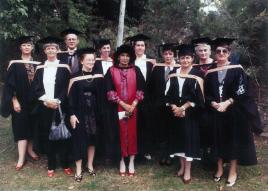CQU celebrates 20 years of nursing
Published on 12 July, 2007

The first graduates of the nursing degree at the then CIAE (CQU).Central Queensland University is celebrating 20 years of teaching nursing this year.
Since its first induction of nursing students, CQU has produced some outstanding nurses many of whom are now working in clinical positions in Central Queensland, as nursing directors in major hospitals or as influential academics in nursing and health faculties.
CQU, or CIAE (Capricornia Institute of Advanced Education) as it was then known, enrolled its first nursing students in 1987 to provide existing registered nurses with the opportunity to upgrade their qualifications. This was in response to nursing education moving from hospital-based programs to the tertiary system.
The then Director of Nursing at the Rockhampton Hospital, Norma West believed strongly in higher education for nurses and midwives. She lent her support by ensuring the Rockhampton Hospital was a place for student nurses and midwives to gain their clinical experience.
The Bachelor of Applied Science (Nursing) proved to be very popular with practising nurses and midwives with applications for the program regularly exceeding places available.
As the only regional institution in Queensland offering courses in nursing at the time, the Institute was committed from the outset to provide the program via distance education. The course could be completed in 4 years by part-time external study and was available to currently registered nurses.
Senior academic staff for the degree course at the time included Dorothy (Darby) Paull, Margot Locke and Marlene Roadruck. Derek Garratt was added to the teaching staff in 1988, becoming a driving force in the development of the nursing school. Mr Garratt, a nurse educator at the Rockhampton Hospital before joining the University team, coordinated the distance education offering of the nursing program.
Mr Garratt said the idea was to give degree opportunities first to qualified nurses. This proved popular with not only staff nurses, but also ward sisters and even matrons of small country hospitals.
He said there was some initial resentment toward the new degree-qualified nurses by some hospital staff who did not have university qualifications, just as later on there were reservations about the ability of university students working in hospitals while on clinical placement. There was also a resistance to nurses working in a university setting, but this was overcome because of the small, hard working nursing team.
"We had to work with other university departments and this oiled the wheels of integration in the uni."
The Post-RN degree-completion nursing program moved quickly from being a Department in the Faculty of Applied Science to being the foundation program of the then Faculty of Health Science.
The appointment of Dr Amy Zelmer (who became Dean of the Faculty of Health Science) marked a further milestone in the rapid progress of the nursing department. Formerly Associate Vice-President and Professor at the University of Alberta in Canada, Dr Zelmer had worked in community health in Canada and some developing countries before gaining extensive tertiary and administration experience. Dr Mary Ann McLees joined the Faculty as Associate Dean in 1989.
Aware of the problems confronting regional communities, Dr Zelmer encouraged support for remote nursing and improved access to the degree course through a continuing education program. Dr Zelmer has since been appointed as Emeritus Professor of the University.
It wasn't long before the Faculty of Health Sciences (which included the nursing programs at that time) had outgrown its premises on-campus and work began on a new $3 million health science building in 1989.The building was completed in 1990 featuring a 300-seat modern lecture theatre, state-of-the-art audio-visual equipment, clinical practice areas as well as a computer laboratory and accommodation for 30 staff.
With the completion of the building and marking the graduation of the first post registration nursing class, the department began offering on-campus pre-registration programs.
About 100 students attended classes conducted by 10 staff for a pre-registration diploma which was subsequently upgraded to degree status for 1992. An essential feature of the program was its clinical component.
By 1992, there were 20 academic staff employed by the Faculty of Health Sciences, including one of the nursing program's first graduates Dawn Hay, along with Trudy Dwyer, Leone Hinton, Diane Goldsworthy and Kerry Reid-Searl who all are still employed by CQU.
Today, CQU has 850 students enrolled in the Bachelor of Nursing, Bachelor of Health (Nursing) - Post-registration) across 4 campuses and via distance education.
There have also been graduates in midwifery, masters and PhD degrees in nursing and related fields.

